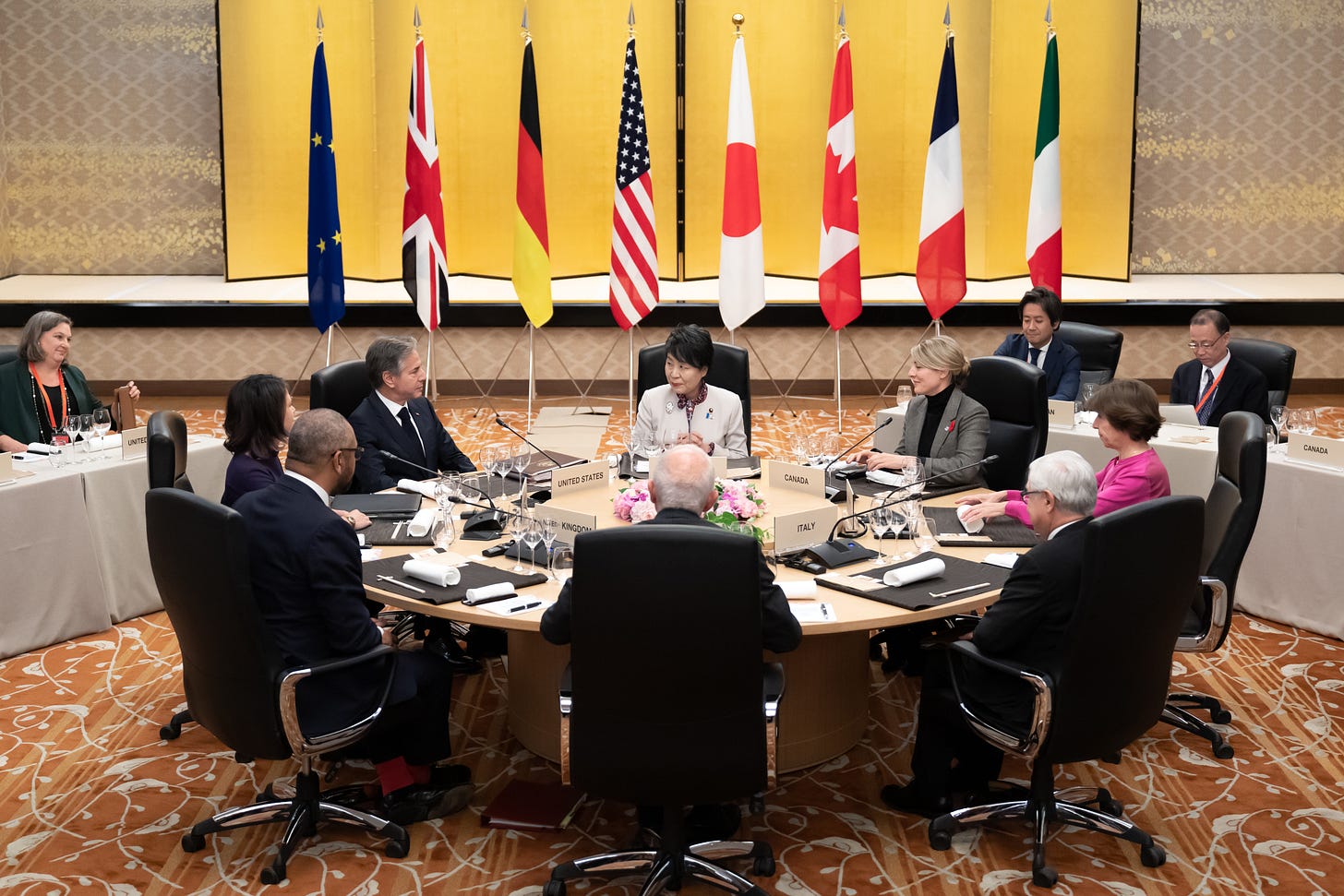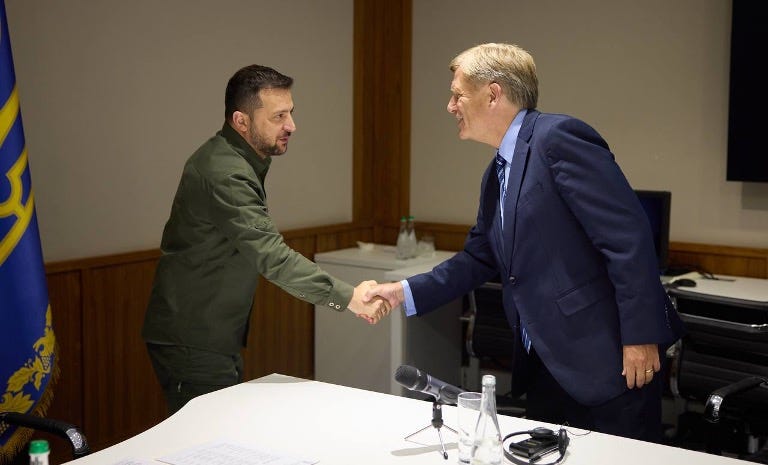The G-7 Must Strengthen Bans on Technology Exports to Russia
When the G-7 leaders meet in Italy, they should focus on new ways to deter China from strengthening Russia’s military-industrial complex, but also stop Western companies from doing the same.
As many of you already know, I coordinate an International Working Group on Russian Sanctions. You can read our work here. In this essay, I want to highlight two of our recent papers, which I hope the G-7 leaders read before meeting in Italy next week.

1. One of our most research-intensive papers was our Working Group Paper #16:
Challenges of Export Controls Enforcement How Russia Continues to Import Components for Its Military Production, published on January 11, 2024.
This paper in detail documents the flow of technology from China and some Western companies (through intermediaries) to Russia. Chinese support of Russia’s s military-industrial complex is growing and rightly getting more attention from Western officials, including the Secretary of the Treasury Janet Yellin and Secretary of State Tony Blinken. They both discussed the issue during recent visit to China. What is even more shocking is the volume of Western technology components that end up in Russia through exports of consumer products to third countries. Russia then strips these products of their chips to produce weapons. Look at the data in Working Paper 16. It’s shocking. This must stop. When I met with President Zelenskyy in Kyiv last September, this was the issue he especially focused on during our meeting. He asked me why the U.S. government allows its companies to send their technology to Russia, which is then used to build Russian weapons, which the Ukrainian army then tries to shoot down using expensive American air defense systems paid for by the American taxpayers. He said to me that this makes no sense. He is right.
2. Our working group paper from May 2024 offers some solutions. It is called: Working Paper #19: Action Plan 3.0 Strengthening Sanctions Against the Russian Federation.
Based on our research, the G-7 countries should sanction Chinese companies providing this technology to Russia as well as Chinese banks facilitating these tech transfers. Other measures that can slow down this tech transfer should be followed as well. Before sanctioning Chinese actors, however, we must sanction our own companies and financial institutions helping Putin’s war machine. Doing so first will make our actions against China (and other countries in this business) more credible. G-7 leaders could also consider naming and shaming measures, know-thy-costumer obligations to also reduce the flow of Western technology to Putin’s war machine through intermediaries. Some experts have even suggested that tracking technologies can be attached Western products, machine tools in particular, that are making their way to Russia’s military industrial complex. For instance, Tuft’s Professor Chris Miller wrote in The New York Times last December that
Companies making controlled tools should be mandated to install tamperproof geolocation in them. An Apple AirTag costs less than $30. Manufacturers of million-dollar tools can surely find a cost-effective way of incorporating government-approved geolocation into their dual-use devices and providing real-time verification to the Commerce Department. Ideally, if a prohibited tool were transferred into Russia or a prohibited Chinese plant, it would be disabled automatically.
Taking bold steps on this front in Italy next week is much needed. For more details of what should be done, here is the excerpt from Action Plan 3.0 on how to control the flow of technology into Russia more effectively:
As we documented in detail in previous working papers,15 too many critical technologies are flowing into Russia that help build weapons which are then deployed to kill Ukrainian citizens and soldiers. The sanctions coalition must tighten restrictions on Russian access to microelectronics, Computer Numerical Control (CNC) machines, software, navigation, radio, and chemicals for explosives and other components used in the defense sector. Export controls, i.e., technology bans, remain a powerful tool to constrain Russia’s military-industrial complex, as Russia appears to not have found alternative suppliers for many war-critical imports. However, changes to the current approach are needed to improve their effectiveness.
First, bolstering corporate responsibility is key in this context. Improved enforcement of export controls will ultimately not be possible without buy-in from the private sector, especially coalition-based producers of goods needed for Russia’s military industry. Any effective control of the supply chain has to begin with the initial sale of an item to a distributor, (See Working Paper 16: Challenge of Export Controls Enforcement: How Russia Continues to Import Components for its Military Production and Working Paper 12: Strengthening Sanctions to Stop Western Technology from Helping Russia’s Military-Industrial Complex) as it becomes increasingly complicated to trace its physical whereabouts and impede any illicit activities post-sale. To create incentives for corporations to set up compliance procedures, enforcement agencies must demonstrate a willingness and ability to investigate the trade with controlled goods and impose meaningful fines in the case of export control violations.
Second, significant inconsistencies continue to exist within the Russian export control regime, which hinders effective enforcement and allows for circumvention. Restrictions need to be harmonized across coalition jurisdictions along with derogations and licensing procedures, criminalization of sanctions violations, and negligence provisions that outline procedures that companies are expected to follow. As many of the goods in question are produced on behalf of coalition-based companies in third countries, it is also important to ensure that export controls in all jurisdictions apply extraterritorially the way U.S. ones do under the Foreign Direct Product Rule.
Third, targeting intermediaries in third countries, which provide Russia with war-needed goods from coalition-based producers, is critical. This includes companies in China, Turkey, the UAE, the Caucasus, and Central Asia. They can do so by imposing sanctions on entities that have been found to facilitate export control violations involving any companies or individuals from coalition countries. If this is done comprehensively (i.e., going beyond the current piecemeal approach that targets only a small number of such companies), consistently (i.e., across all coalition jurisdictions), and regularly (i.e., responding to the adaption of the circumvention network), it can throw a serious wrench into Russia’s procurement efforts. Any coercive measures should be accompanied by outreach to public and private sectors in key third countries.
Fourth, enforcement agencies in sanctions coalition countries are not adequately equipped to implement and enforce comprehensive export controls such as those imposed on Russia. This includes the United States, where such measures have a longer track record. The European Union lacks unified enforcement structures altogether, as member states remain responsible for implementing restrictive measures, including those imposed on the EU level. Considering that export controls will be an important part of the economic statecraft toolbox for the foreseeable future, these weaknesses need to be addressed.
Better multilateral cooperation is key. For this purpose, democratic countries should also re-establish the Coordinating Committee for Multilateral Export Controls (CoCom). During the Cold War, the United States worked with allies and partners to create CoCom to limit the transfer of goods and technologies to the Soviet Union and other communist states that could be used to advance military capabilities. CoCom produced positive results, in part because the organization was international, which helped prevent systematic evasion through loopholes. While CoCom was not perfect, the model is the right one for limiting the transfer of military and dual-use technologies to Russia. A new CoCom, based at the OECD, should be established today.





I hope President Biden is listening to you.
And not just the consumer-available chips, it’s CNC machine tools worth hundreds of thousands of dollars each, put on rail cars from China to North Korea and on to Russia, that worry me.